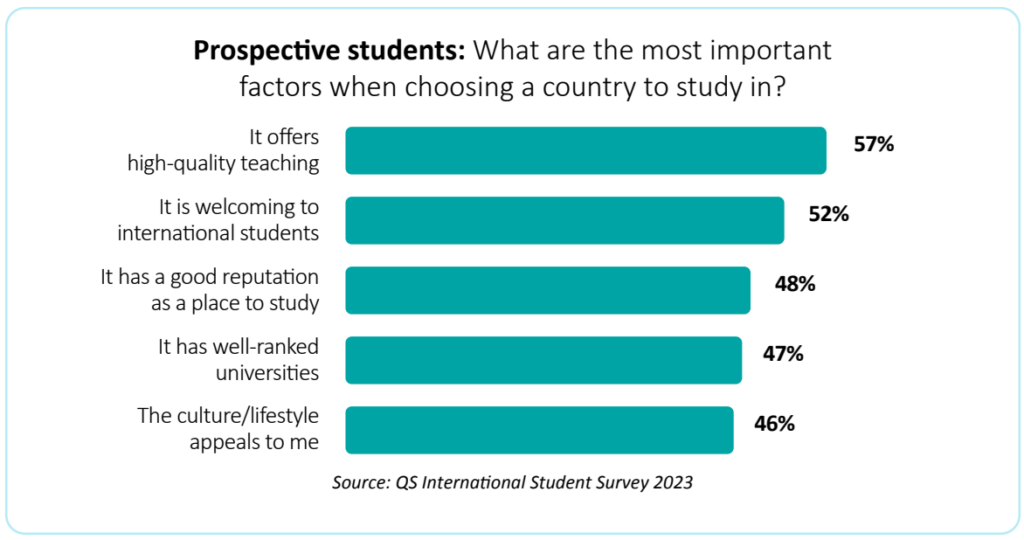
Experts on a recent panel discussed the importance of graduate outcomes following the release of a QS and Universities UK International (UUKi) report.
To mark the launch of the International Graduate Outcomes 2024 report, QS hosted a panel of UK higher education experts to take an in-depth look at what international graduates think about their UK degrees and provide recommendations for universities.
Speaking on the LinkedIn live session, Jamie Arrowsmith, Director at UUKi said, “The report shows that there are fantastic things that international students go on to do. But most importantly, they’re able to fulfil their ambitions, have access to future employment opportunities and really take those footsteps in their careers. I think the report is a great foundation for giving us the evidence-base to understand those fantastic outcomes that students get.”
He continued, “It also raises questions and challenges for the sector because we want to ensure that all the students choosing the UK reflect positively on their experience and are absolutely getting the support they need to start their careers. The report also shows that there’s far more we can do as a sector and as a community to support international students.”
Bridging the career support gap
In the live session, Karen O’Brien, Vice-Chancellor at Durham University, expressed concern when reflecting on the findings that only three percent of respondents in work found a job through university career services.
“A major motivation for study is clearly getting into their careers. If our careers services aren’t giving them enough of what they need, we really need to reflect on that.”
Over 49% of prospective international students planning to study in the UK cite proven graduate outcomes and strong career placement records as one of the most important factors when choosing a university, making it the second-highest priority for them.
QS International Student Survey 2023
Sanam Arora, Founder and Chair, NISAU highlighted the need for institutions to recognise and reconsider their approach to employability – and reflect the mindset of students.
“Students are not thinking in silos about education, study and work. Study experience is much like the work experience element that the “Graduate route” facilitates. When international students are coming to the UK and putting a significant amount of money on the line, often with expensive loans that they’ve taken out, they’re coming because they trust the UK to transform their futures and to help them contribute to the UK as well as their home countries. So, the only thing they’re seeking is a return on their investment.”
Is the UK’s competitive advantage in higher education at risk?

QS Chief Executive Officer Jessica Turner emphasised that while the quality of education in the UK remains strong, it is crucial to continue funding and supporting the sector to maintain its prestigious status as an export success story. “It will take decades to get it back if it’s lost.
“Students are usually looking at institutions in the UK and comparing them with universities in the US, Canada, Australia, and New Zealand. The UK and the US stand out for the quality of their universities. In an environment where it’s less easy for students to access locations like Australia or Canada, the US presents tough competition for the UK. However, the UK has real distinctive advantages built over decades and centuries. It’s a very precious position that shouldn’t be taken for granted.”
Wage disparities
While investigating salaries is a key metric for students looking for a return on their investment, there are other benefits to studying abroad.
Harry Anderson, Deputy Director of Policy & Global Engagement at UUKi, said that while there is a lot of focus on the financial outcomes of international students, it’s important to also recognise the broader contributions they bring to the higher education sector.
“The key innovation about the Graduate route is that it’s a flexible visa and it allows people to find the time to work, look for work and do other things. So, it’s probably not surprising to see that earnings are slightly different on the Graduate visa compared to a Skilled worker visa for instance, where you need to be earning a certain amount at a certain skill-level straight away.”
Mr Anderson added another observation: “The survey also tells us that a lot of people are also working in small and medium-sized companies (SME’s). Outside the Graduate route, our current visa system doesn’t really facilitate a lot of people working in those types of roles. So, it’s actually really important to recognise what’s going on there.”
How can UK universities support international students in times of economic uncertainty?
Professor O’Brien said, “At the moment, we’re seeing the collapse of the Nigerian currency for example; international students are coming here without a safety net. At Durham University, we have funds and have been supporting. However, I do think we need to do better as a sector to provide a safety net. People come in good faith, but currencies collapse, and things happen.”